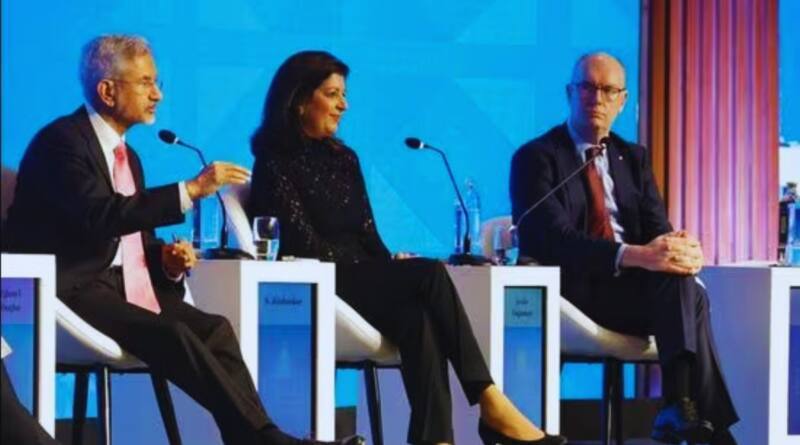Now Finding Equilibrium in Ties: A Test for Both Country
One of the foremost difficult challenges for both India and China will be to attain, and after that harmony, outside issues, S. Jaishankar said on Friday, amid the dragging standoff between the two sides on the Line of Real Control (LAC).
Instead of locking in “intellect diversions” that are usually a two-sided issue, India ought to be sure sufficient to “use” the worldwide framework to realise the finest conceivable result, Jaishankar said amid a session at the Raisina Exchange, India’s lead conference on geopolitics and geoeconomics.
Jaishankar also protected Russia, a near-vital accomplice of India, in reaction to a panellist’s address around whether Russia was getting to be a junior accomplice of China as a result of its isolation after the attack on Ukraine. Russia’s outside service expressed that the nation would never lock in a “single relationship of an overpowering nature,” citing its statecraft tradition.
He repeated that the prompt issue between India and China was Beijing’s choice to withdraw from border assentions built up within the late 1980s, particularly in terms of “how they carried on the border, and there’s a pushback from our side.” He was alluding to the military standoff within the Ladakh segment of the LAC, which started about four years ago.
“Accomplishing and keeping up harmony will be a major challenge for both nations.” “It won’t be simple,” Jaishankar said. Indicating the plausibility of “intellectual recreations” that are typically proposed as an issue between India and China, he stated that other variables can be utilised to attain “superior terms on an equilibrium.”.
Instead of giving a competitive nation a veto over India’s policy choices, modern Delhi ought to be “surely sufficient to use the universal framework to make the most excellent result,” he added.
Since the start of the LAC standoff in May 2020, India and China have conveyed around 60,000 troops each within the Ladakh segment. The Indian side has demanded that bilateral relations cannot be standardised until there is peace and serenity along the LAC.
Jaishankar, moreover, looked to call into question the West’s position towards Russia, expressing, within the context of Russia-China relations, “On the one hand, you have got whose sets of approaches bring the two together, and after that, say, be careful of them coming together.”
We have to be Russia. Russia is moving its focus to Asia or other parts of the world as numerous entryways within the West have been closed to it.” It makes sense to provide Russia with a few alternatives. “In case we constrain Russia into a single choice and say that’s truly awful since that’s the result, you’re making a self-fulfilling prescience,” he explained.
Other nations, especially in Asia, ought to lock in Russia, a “control with a gigantic convention of statecraft” that would never enter into a “single relationship of an overpowering nature,” according to the speaker.
In reaction to an address that almost ought to change world bodies such as the Joined Together Countries, Jaishankar expressed that there have been a few advances in the development of different models for change. After considering these models, the global community will have to take another step, which is still unknown. The inclusion of the African Union in the G20 ought to instruct the UN on the significance of extending the Security Council’s lasting participation, he said.
Aside from India’s G20 administration, which demonstrated its authority capacities in a globalised society, the country has also risen as a responder to occurrences within the locale between East Africa and Australia, Jaishankar stated.
At a time of intense competition between China and the United States, nations like India that aren’t “implanted in a pre-existing structure” are expanding options, whereas others are endeavouring to manufacture common ground with other like-minded states, he said.
“A part of nations will now try to have numerous choices, and indeed, as they do that, they will frame combinations of their claim,” he said.
Jaishankar went to the session, which also included agents from think tanks in Australia, Nigeria, the Joined Together Kingdom, and the Joined Together States. “India has never freely scrutinised Russia’s activities in Ukraine, and it expanded its buys of marked-down Russian rough in spite of introductory Western weight.
Whereas India has never voted in support of a few resolutions on Ukraine at UN bodies, it has more than once called for a conclusion to the struggle and a return to the way of discourse and strategy,” said Sameer Patil, a Mumbai-based security analyst. Jaishankar’s remarks were an acknowledgement of the fact that the West’s constant pushback on Russia will only draw it closer to China, complicating India’s options.
“On the other hand, Jaishankar’s comments on China are a recognition that India-China relations are headed for a long period of freeze, which is only getting to harden India’s approach,” he added.




